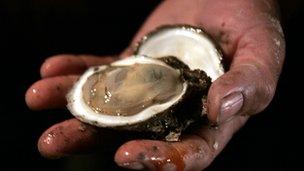Carlingford Lough oysters die in hot weather
- Published

A number of oysters have been killed following the outbreak of a virus in Carlingford Lough in County Down.
The Department of Agriculture and Rural Development (DARD) said ostreid herpes was detected on Wednesday following a sample of dead pacific oysters.
DARD said there have been no other mortalities reported in Northern Ireland.
"The deaths appear to be linked to the hot weather," a DARD spokesperson said.
"The virus appears to lie latent until water temperatures reach 16 degrees Celsius, at which stage the oysters begin to die very quickly.
"Temperatures have risen to 20 degrees Celsius in recent days which has significantly reduced dissolved oxygen levels in shallow areas where oysters are grown.
"Such temperatures are not unusually warm, but combined with the presence of the virus, conditions have resulted in oyster mortalities."
Decimation of oyster farming
South Down SDLP MLA Seán Rogers said some local farmers are under "horrendous circumstances."
"One farmer has lost 80% of his stock in just two days, which is essentially three years of hard work in often very difficult conditions," he said.
"It's assumed that these losses are linked to the unusually high water temperatures of late in Carlingford Lough. We could potentially be looking at the total decimation of oyster farming as we know it locally."
DARD Chief Fisheries Officer Mark McCaughan has said there are currently no "compensation mechanisms" in place for lost stocks.
The Food Standards Agency is not aware of any reports of human illness associated with this virus.